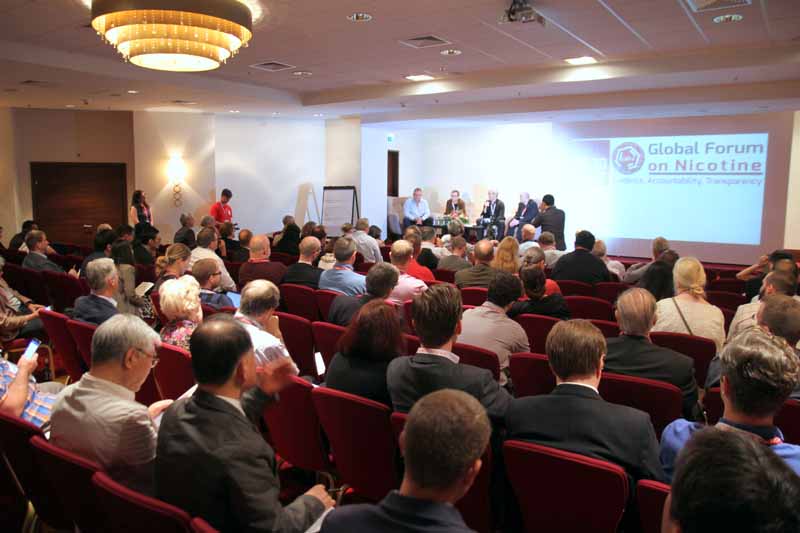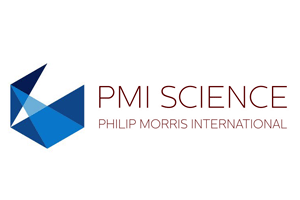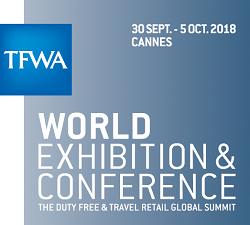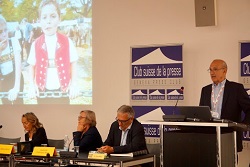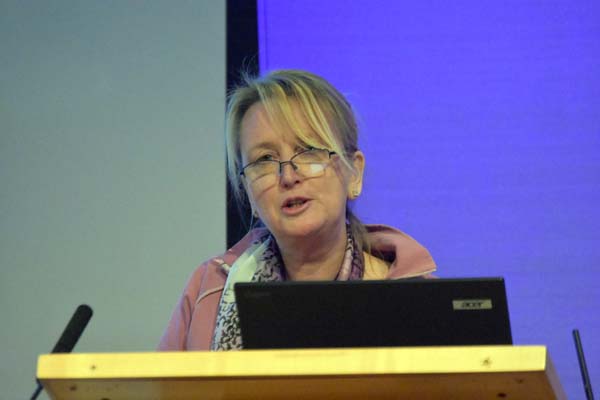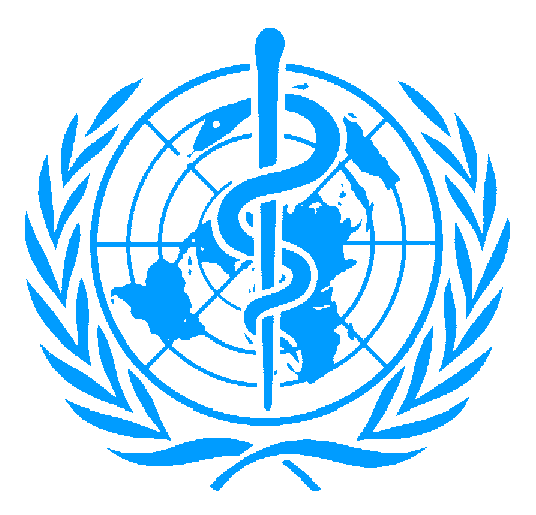Registration has opened for the Global Forum on Nicotine (GFN) 2019, with a special offer on delegate fees.
The sixth GFN is scheduled to be held at the Marriott Hotel, Warsaw, Poland, on June 13-15.
The organizers say that those who register by the end of this year will pay the same fee as they paid for attending this year’s event.
The GFN 2018 attracted about 450 people from more than 60 countries and was reckoned by the organizers to have been the most successful GFN to date.
Pre-event publicity for the 2018 event described it as including a conference comprising plenary sessions, parallel sessions and panel debates; a film festival; and the second International Symposium on Nicotine Technology (ISoNTech).
Further information is available from: joanna@kachange.eu.
Tag: International

GFN registration opens

New IQOS versions
Philip Morris International said yesterday that it had launched the next generation of its heated-tobacco product, IQOS.
‘The new IQOS 3 and IQOS 3 MULTI integrate extensive consumer insights and feedback to improve design and user experience while maintaining signature taste, sensory attributes and ritual — all underpinned by strong scientific substantiation,’ PMI said in a note posted on its website.
‘The new versions aim to further encourage a growing number of smokers to switch, to the benefit of their health, public health and, ultimately, society.
‘The new iterations were launched today in Tokyo, Japan – the country considered the birthplace of IQOS.’
“Our dream was to create a better alternative for smokers, and IQOS has made this dream a reality; it’s a revolution for the 1.1 billion people who smoke,” André Calantzopoulos, PMI’s CEO, was quoted as saying. “IQOS 3 and IQOS 3 MULTI deliver significant improvement and innovation and mark another step toward convincing all men and women who would otherwise continue to smoke to switch to smoke-free alternatives. IQOS consumers know that this product changes many things in their lives – we thank them, and we thank Japan for leading this positive change.”
PMI said that robust science underpinned every development at PMI. ‘Its scientific assessment program is based on longstanding practices of the pharmaceutical industry and is in line with US Food and Drug Administration (FDA) guidance,’ the note said.
‘IQOS produces an aerosol that contains on average 90 percent lower levels of harmful chemicals than cigarette smoke. The totality of PMI’s preclinical and clinical evidence indicates that switching completely to IQOS presents less risk of harm than continued smoking.
‘Evidence also shows that IQOS does not negatively affect indoor air quality. On average, 70 to 80 percent of IQOS users have quit cigarettes, which makes IQOS the most compelling smoke-free alternative today.’
PMI said it had filed a Modified Risk Tobacco Product Application (MRTPA) for IQOS with the FDA, which was still under review.
Diplomatic smoke signals
Hungary’s Minister of Foreign Affairs and Trade Peter Szijjarto has imposed a tobacco-smoking ban on the ministry’s properties and on those of Hungarian embassies around the world, according to a Xinhua News Agency story citing an ‘official’ speaking in Budapest on Saturday.
‘Smoking is henceforth prohibited in all of the locals of the Ministry of Foreign Affairs and Trade,’ the Hungarian official journal reportedly announced. ‘The ban concerns all of the real estates falling under the management of the ministry, may it be owned or rented, in Hungary or abroad, such as embassies.’
The new measure bans also the designated, enclosed smoking areas, that have been in use up to now. Smokers will be allowed to smoke only outside, on the streets.
The directive does not stipulate how often employees can break from their work to smoke a cigarette.
Public looking for facts
A new global survey has indicated that 77 percent of adults agree that governments should do all they can to encourage people who would otherwise keep smoking cigarettes to switch completely to ‘better alternatives’.
The survey was commissioned by Philip Morris International and conducted by Ipsos.
In a note posted on its website, PMI said that smoking was ranked alongside obesity, alcoholism and opioid use in its importance as a public health issue. Importantly, the multinational survey showed strong support for the role that innovation and technology should play in resolving these global health problems.
“This survey shows that most people around the world agree that smoking is still a serious public health problem,” Dr. Moira Gilchrist, vice president of scientific and public communications at PMI, was quoted as saying. “They want to see action to tap into the opportunity provided by alternatives to cigarettes that are scientifically substantiated. We are in complete agreement with that view. Public opinion aligns with common sense, and the survey confirms what we have heard for more than a decade.”
PMI said the survey results had shown also that 86 percent of respondents believed consumer goods companies had an obligation continually to research and innovate their products in the interest of public health. ‘However, only 35 percent thought that governments have done a good job to ensure everyone has access to the latest innovations and advancements,’ the PMI note said. ‘Clearly, society does not want governments to block promising solutions to public health problems.’
Publication of the study results follows a meeting of the Conference of the Parties (COP) to the World Health Organization’s Framework Convention on Tobacco Control (FCTC) in Geneva last week, where 181 member countries and non-governmental organizations (NGOs) met to decide on global tobacco control policy recommendations. None of their discussions were open to the public or media.
‘Although many individual states took progressive positions, the disappointing and unfortunate outcome of the COP will mean that millions of smokers will not know about better alternatives to cigarettes,’ PMI said. ‘This approach is in sharp contrast with public opinion: 92 percent of those surveyed agreed that smokers should have access to accurate information to guide their choices.’
Gilchrist said the science was clear. “The evidence shows that switching to a smoke-free product is a better choice than continuing to smoke,” she said. “We simply cannot keep smokers in the dark about this information. The COP missed an opportunity to put people and science at the heart of its policymaking.”
‘Contrary to common sense, the tobacco industry has been discouraged from innovating and inadvertently encouraged to keep cigarettes at the core of their business models,’ PMI said.
‘Despite this, at PMI we will not waiver from our commitment to provide the world’s 1.1 billion smokers with better alternatives to cigarettes, as well as information about these options.
‘Countries now have the opportunity to implement local regulations that embrace science and technology. Progressive polices can effectively protect overall population health, while still working in the best interests of men and women who smoke.’
“With any other global problem, from the environment to obesity, everyone works together to deliver better alternatives, inform people about them and incentivize them to change behavior,” Gilchrist said. “Why should this common-sense approach not apply to tobacco?”
‘The clear call from society for more information about, and access to, better alternatives to cigarettes did not come without important caveats that we support,’ PMI said. ‘Of those surveyed, 92 percent agreed that these new products must have robust scientific testing prior to being introduced into the market, and 91 percent agreed that once these products have been introduced their impact needs to be monitored to ensure they are reducing the harm caused by cigarettes.
The survey data can be view here.
'Highly successful' show
The Tax-free World Association (TFWA) says it is celebrating what it describes as ‘another highly successful TFWA World Exhibition & Conference, at which numbers reflected ‘the buoyant mood across the conference and exhibition halls’.
The TFWA World Exhibition & Conference was held at the Palais des Festivals, Cannes, France, between September 30 and October 5.
In a press note, the TFWA reported that a record 7,015 visitors had attended the event, up three percent on the attendance at the 2017 event.
The visitors had represented 3,088 companies, up two percent on the figure of last year.
‘Strong statistics from the exhibition also bore witness to the healthy position of the duty-free and travel retail industry,’ the press note said.
‘An extension of the Beach Village saw exhibition floor space increase to 22,759 m2, up from 22,607 m2 last year.
‘The number of exhibitors also grew slightly from 514 in 2017 to 516, across 496 stands compared with 490 last year. Of these, 50 exhibitors were new or returning to the event, while 14 official boats were moored in Harbour Village.
‘The opening conference was attended by an impressive 1,676 delegates, up two percent on last year.
‘On Tuesday morning, the Digital Focus Workshop attracted 310 attendees, surpassing the turnout of 237 attendees at last year’s event.
‘The Inflight Focus Workshop, held on Wednesday morning, also had a standout showing, and was attended by 243 delegates compared with 195 last year.’
PMI supports protocol
Philip Morris International said today it was publishing a position paper supporting an international protocol aimed at eliminating the illegal trade in tobacco products.
The first Meeting of the Parties (MOP1) to the Protocol to Eliminate Illicit Trade in Tobacco Products, which is a protocol of the World Health Organization’s Framework Convention on Tobacco Control, is taking place in Geneva this week.
‘With approximately one out of 10 cigarettes smoked globally stemming from illicit trade, Parties to the Protocol should take a collaborative approach to tackling the problem of illicit trade,’ PMI said in a note posted on its website. ‘Available on PMI’s website, the position paper proposes effective strategies for tackling the illicit tobacco trade, aligned with key provisions of the Protocol.’
Meanwhile, Alvise Giustiniani, vice president of illicit trade prevention at PMI, was quoted as saying the Protocol was a significant and crucial global tool to tackle the serious issue of the “illicit tobacco trade”. “We strongly support the objectives and principles of the Protocol, as well as the Meeting of the Parties which is an important step in tackling the multi-faceted and highly complex problem of illicit tobacco trade,” he said
‘The Protocol brings together countries against the scourge of illicit tobacco trade, and it will have a key role to play in helping to defeat the illegal tobacco market,’ the position paper says. ‘Collaboration will be a key element of its success: national governments, international organizations and civil society working to fight illicit tobacco trade together.’
PMI said that, in its view, effective strategies for tackling the ‘illicit tobacco trade’ must be articulated across the following six pillars:- ‘Product tracking and tracing based on open and recognized international standards
- ‘Effective control and monitoring of Free Trade Zones
- ‘Enhanced international co-operation
- ‘Application of deterrent sanctions to illicit traders
- ‘Licensing regimes that focus on tackling illicit trade
- ‘Meaningful due diligence and record-keeping requirements.’
PMI has a dedicated website StopIllegal https://www.stopillegal.com/

Pressure to ratify FCTC
One hundred-and-six organizations, led by Oxy-Suisse and Action on Smoking and Health (ASH US), yesterday sent a letter to the President of the Swiss Confederation calling on Switzerland to ratify the World Health Organization’s Framework Convention on Tobacco Control (FCTC) and to change radically its relationship with tobacco companies.
In a note alerting the media to the letter, ASH US said Swiss citizens were being poisoned and killed, and the government was failing to act.
The note said the request to ratify the WHO treaty was being made during the eighth meeting of the Conference of the Parties (COP8) to the FCTC, at which delegations from 137 countries, along with representatives of United Nations agencies, other intergovernmental organizations and civil society were coming together to discuss the progress being made in tobacco control around the world.
‘This important bi-annual discussion is currently in session in Geneva, which is ironic, because Switzerland is not party to the treaty,’ the note said.
‘Switzerland’s domestic tobacco control efforts lag behind as well. The new draft tobacco product law (LPTab) in Switzerland has a goal of maintaining smoking rates in Switzerland at the current level at least until 2060, a goal which translates into deliberately preserving at current levels the associated mortality of 9,500 tobacco-related deaths per year and morbidity of over 300,000 persons seriously ill because of tobacco.
‘The Swiss government is failing its human rights and Constitutional obligations to protect the right to health and right to life of its citizens.
‘The Swiss government and the Swiss people are being held hostage by an industry that takes advantage of the system’s vulnerabilities. Which, of course, is exactly what the tobacco industry intended when they came to Switzerland in the first place – they knew that they could exploit Switzerland’s vulnerabilities to sell their deadly products and establish Switzerland as their global sanctuary.’
Switzerland’s lack of tobacco control was said to be violating the human rights not only of Swiss people but of those around the world.
‘Three major tobacco companies, Japan Tobacco International (JTI), British American Tobacco (BAT), and Philip Morris International (PMI) have large factories in Switzerland, while two of them, JTI and PMI, have their global headquarters in the country,’ the note said. ‘Executives in those offices make decisions regarding their deadly products which are marketed and sold all over the world.
‘Switzerland’s relationship with tobacco also negatively impacts its ability to become a global development agency, as tobacco is an unquestionable enemy of development.’
The 106 organizations are calling also for Switzerland to sign up to the FCTC and the new Illicit Trade Protocol, to enact tobacco control legislation compliant with WHO FCTC obligations, and to model its relationship with tobacco companies on the guidelines of the FCTC.
PMI on track
Philip Morris International and Scuderia Ferrari yesterday entered a new phase in their 45-year partnership with the unveiling of Mission Winnow, a new global initiative to create engagement around the role of science, technology and innovation as a powerful force for good in any industry.
The global initiative is taking to the tracks this week at the Formula 1 2018 Honda Japanese Grand Prix at Suzuka.
“Through Mission Winnow we want to let the world know how we have changed, to share our pride in the transformation that the people of PMI have achieved, as well as our dedication to rigorous science and innovation that can lead to a better future,” said André Calantzopoulos, PMI’s CEO.
“We will use this global platform as a window into the new PMI and to challenge preconceptions, as we know there are many who may have doubts about us and our motivations. Our partnership with Scuderia Ferrari gives us the opportunity to build on many encouraging individual conversations with critics and supporters alike and reach out to a broad audience to engage at scale.”
‘The word “winnow” (pronounced: “win”– “oh”) was selected because it perfectly describes the meticulous and disciplined route that PMI is following to achieve its ambitious vision of a smoke-free future,’ PMI said in a note posted on its website. ‘The word – and PMI’s vision – is about focus, transparency, care and single-minded determination.
‘”Winnow” originally referred to the removal of chaff from grain, but it came to be used more broadly to describe the separating out of the unnecessary, the extraction of the good and distinguishing what is true from what is inaccurate or misleading. For PMI, this is critically important in a world of information overload.
‘The company also believes it is critically important to adhere to an uncompromising commitment of continuous improvement through the dedicated and diligent pursuit of scientific and engineering excellence with an intense focus on details. This commitment and focus are creating a paradigm shift in the tobacco industry toward a better future.’
“Mission Winnow encapsulates our commitment to strive for better in everything we do,” said Calantzopoulos. “To winnow, or to discard old approaches, is what we at PMI are doing – we take learnings from past mistakes to shape our future.”
PMI said in its note that, in driving toward the future, it had chosen a path that was in all aspects very complex and faced many challenges. Like Scuderia Ferrari, the company had set a course forward, and there was no turning back: PMI had to progress constantly and rapidly, examining and analyzing the way ahead by learning every day and adjusting to improve at the next corner.
“Mission Winnow is about how we are transforming as a company, what we believe in and the way we work to enable a better future,” said Miroslaw Zielinski, president science and innovation at PMI. “Scuderia Ferrari is the ideal partner for Mission Winnow because of the team’s passion for innovation and drive to constantly improve in the quest for victory.
“We are launching Mission Winnow in the F1 circuit because motorsport fans understand there is no reverse gear in racing, only forward thinking and we believe they will want to share this vision.”
PMI said that Mission Winnow provided an insider’s view of two companies that operated in very different fields but had a great deal in common. ‘For both companies, success hinges on the passion of their people for the highest standards of performance in pursuit of overarching ambitions,’ it said. ‘Mission Winnow does not and will never advertise or promote any tobacco products. Mission Winnow is not about what, it is about how and why.
More information on Mission Winnow is at: www.missionwinnow.com or @missionwinnow on Facebook, Instagram and Twitter.
COP8 – a 'great opportunity'
An international meeting of tobacco control representatives this week presents a great opportunity for UK delegates to promote the UK’s dramatic success with electronic cigarettes, according to the New Nicotine Alliance (NNA).
The eighth meeting of the Conference of the Parties (COP8) to the World Health Organization’s Framework Convention on Tobacco Control (FCTC) is taking place in Geneva, Switzerland, on October 1-6.
In a press note issued on Friday, the NNA said the FCTC’s COP8 summit in Geneva presented a great opportunity for UK delegates to promote the UK’s dramatic success with e-cigarettes. The NNA said it was calling on UK delegates to communicate to global public health representatives the clear and unequivocal message that e-cigarettes and other alternative nicotine products were far safer than combustible tobacco and should be treated as such.
“E-cigarettes are a proven safer alternative to smoking and the UK boasts over 1.7 million former smokers who have converted from combustible tobacco to exclusively vaping instead,” NNA chair, Sarah Jakes, was quoted as saying.
“In the UK, the government has wisely recognised the significant benefits that tobacco harm reduction strategies can achieve and, as a result of positive messaging towards vaping with campaigns such as Stoptober, has seen smoking prevalence dramatically plummet in recent years.
“COP8 is a perfect opportunity for the UK to showcase this success and share our positive experience with the world.
“How can it be right that developed nations are enjoying great results in reducing the use of combustible tobacco by making safer alternatives available to smokers but sit by as less affluent nations are being railroaded into banning them by the WHO?”
The NNA pointed out that the UK government’s Tobacco Control Plan had committed to back innovative products in its drive to encourage smokers to quit. The government’s recommendations were evidence-based and designed to maximise the benefits of safer nicotine delivery.
Meanwhile, it added, the WHO recognised tobacco harm reduction as a guiding principle of its FCTC, so it was quite wrong that it currently invited nations to prohibit the use of these products.
“The WHO likes to talk about the right to health, but why is a smoker in India or Africa less entitled to access products which could help them quit smoking than a smoker in the UK or Canada?”, asked Jakes. “Furthermore, we have heard worrying reports that the EU is planning to petition the FCTC to call for a global ban on e-cigarette advertising. It would be scandalous if the UK delegation is complicit in such an unwise move and goes against the government’s commitment to improve availability of innovative products. What is the point of talking positively of safer alternatives while simultaneously stopping smokers from seeing any publicity about them?
“In Geneva, the UK’s representatives have a golden opportunity to promote the UK’s success with safer nicotine products.
“We provide the FCTC with generous funding to reduce smoking rates in underdeveloped nations. We would therefore urge the government to use the influence our financial contribution brings and do the right thing. That is to reject prohibition of harm reduction which less affluent nations feel obliged to implement due to WHO misinformation, urge the FCTC to adhere to its own articles on the subject, and resist restrictions on promotion of less harmful alternatives to smoking”
Shame about the venue
The fact that Switzerland has not ratified the World Health Organization’s Framework Convention on Tobacco Control (FCTC) but is hosting its conference is shameful, according to a story at swissinfor.ch quoting a top WHO official.
“I think this is more of a shame than a problem that Switzerland is not party to the treaty, as this is all about protecting the public health of the population,” the head of the FCTC Secretariat, Vera Luiza da Costa e Silva, reportedly told reporters at the United Nations headquarters in Geneva on Friday.
State representatives, experts and other officials are meeting in Geneva this week for the eighth meeting of the Conference of the Parties to the FCTC.
Switzerland signed the FCTC in 2004 but has not ratified it, partly due to recent changes to a draft law on tobacco products and specific issues related to advertising and sponsorship.
But it is not alone. Other countries, mainly tobacco-growing states, such as the US, Argentina, Malawi and Cuba, have not ratified the FCTC.
Da Costa e Silva said there was not enough political will in Switzerland to apply all measures in the treaty in the face of the tobacco industry present in the country.
About 180 states are set to attend COP8, followed by the first session of the Meeting of the Parties (MOP1) to the Protocol to Eliminate Illicit Trade in Tobacco Products (October 8-10).
The second conference is due to discuss, among other issues, global, regional and national systems to track tobacco products from the production site to the initial sales site, which is due to be launched by 2023.

